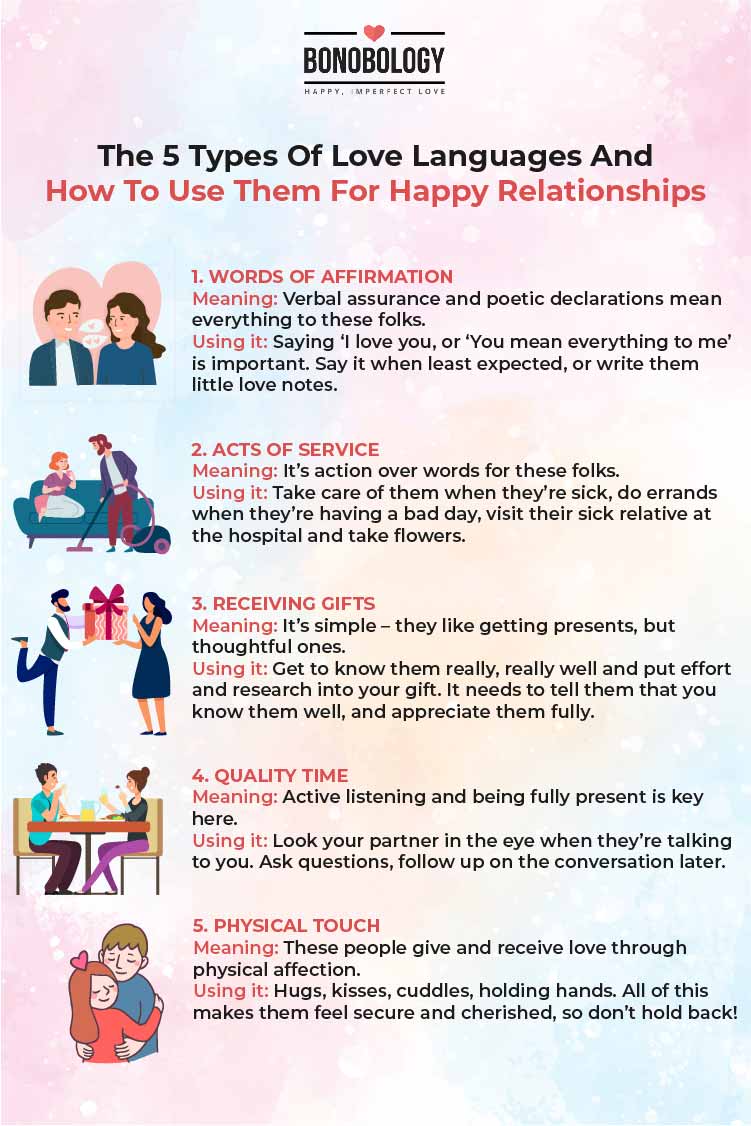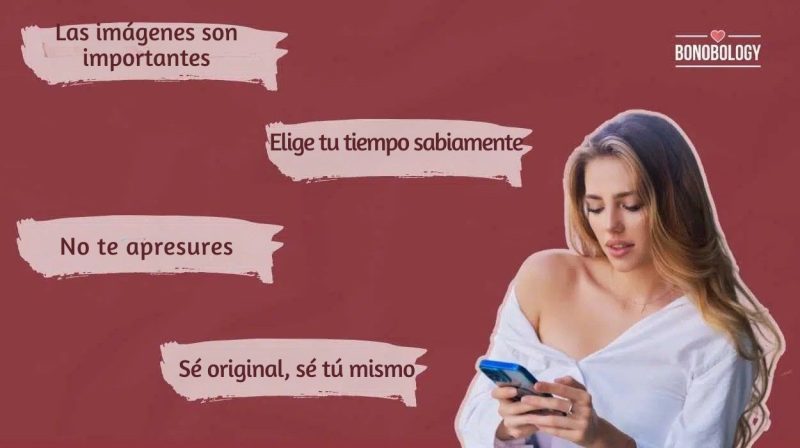“I wanted him to assure me that he is there for me if I ever need him. But he just hugged me silently.” Or “I don’t feel like she recognizes how much I do around the house. She likes giving me thoughtful gifts but that’s not enough.” Has this mismatch of expectations versus incompatible love languages ever happened to you? If yes, then you must know what the different types of love languages are, and how they are the key to a smooth and sustainable relationship.
The roots of this love theory go back to the book The 5 Love Languages: The Secret To Love That Lasts by marriage counselor Dr. Gary Chapman. He came up with the framework that each of us has our own way of expressing love and our own way of wanting to receive it.
So, what are the 5 types of love languages? There are, Gary Chapman claimed, five primary types of love languages and each has its unique components. In this article, we take a deep dive with the expertise of psychotherapist Jui Pimple (MA in Psychology), a trained Rational Emotive Behavior therapist and a Bach remedy practitioner who specializes in online counseling.
What Are Love Languages?
Table of Contents
The meaning of love language is simple. It’s the way you like to give and receive love. It’s how you feel seen and cared for. It’s how you grow closer to your partner. Over 55% of those who have been in a relationship feel most loved when their partner makes them feel emotionally seen, as per a 2023 eharmony report. When it comes to feeling loved, different ways work for different people, as seen from the example of incompatible love languages above.
Knowing and communicating your love languages to the ones you wish to seek love from is essential. It brings more stability and less confusion, more validation and less resentment in a relationship. But remember that the five love languages differ with geography, culture and various stages of life, so it wouldn’t be reasonable to expect them to remain the same everywhere.
For instance, there are places where physical affection in public are taboo or where words of affirmation are considered unnecessary tools to strengthen relationships. This doesn’t mean that certain love languages don’t exist in such places, it only means that they evolve, adjust, or switch as needed.
So, what about you? Does one (or more) of the 5 love languages in relationships resonate with you? Let’s see.
Related Reading: 100 Deep Conversation Topics For Couples: Questions About Love And Life
What Are The 5 Types Of Love Languages?
Each one of us has a love language type to which we are most receptive. However, we are often unaware of the distinction among the different love languages. For instance, you might feel loved when your partner gives you a gift. That is a love language for you. In a healthy and long-term relationship, understanding your partner’s form of love language is the key to maintaining harmony. And that’s what this article intends to do. So, without further ado, here are 5 love languages in a relationship:
1. Words of affirmation
Jui explains, “Verbal expressions of love and affection are key to people for whom words of affirmation are the primary form of love language. They will frequently use statements such as ‘I love you’ or ‘I am glad to have you in life’. People whose love language is words of affirmation also like to hear such words from their partner; it’s how they feel loved and reassured, and thereby safe to express their own feelings.”
Expect a lot of text messages, or even little love notes and emails. These are people who are fulsome with compliments and will always be the first to leave comments on their partner’s social media posts.

2. Quality time
If your partner loves just hanging out with you on the couch or having you around when you’re not doing much, their dominant love language type is quality time.
“Having quality time is an important part of most relationships,” says Jui, “But people with this love language express their feelings to their partner by simply being with them, spending time together even when they are not doing anything specific. There are always different ways to spend quality time to make your partner feel loved and also make your relationship richer.”
Mind you, quality time would mean undivided attention and being fully present with each other. When they’re telling you about their day, they want you to be a good listener, and not just zone out and nod.
3. Acts of service
We’ve all heard that actions speak louder than words, and now it’s an entire love language all by itself. Love is a verb, after all. So, if they’re always ready to wash up after a meal, or bring you your morning coffee, their love language is all about acts of service.
Jui says, “Some people have a different love language. They value actions more than words – they would go out of the way to help their partner as a way of showing how much they love them. For such people, a partner should also try to be a helpmate in their everyday activities and make small gestures that make them feel loved and cherished.”
It’s possible these are people who aren’t all that verbal or physical with their expressions of affection, but they’ll be standing right next to you, ready to help whenever you need them.
Related Reading: How To Say “I Love You” In 15 Different Languages
4. Gifts are a form of love language
Who doesn’t love getting presents, right? However, for some people, receiving and giving gifts is a type of love language. Gift-giving is such a great way to show that you care about someone, that you were thinking about them, and so on. Material manifestations of love might not be everything, but it’s always great to receive love tokens. Who doesn’t want to get cozy gifts for a girlfriend or boyfriend and watch their faces light up?
“Surprising your partner with a thoughtful present can delight them. People with this love language often give gifts to their partners and in return, they thoroughly appreciate receiving gifts from them too. Giving and receiving gifts is one major way of loving their partner,” says Jui.
5. Physical touch
Touch is an important component of any healthy relationship, and physicality is truly its own form of love language. If your partner’s idea of a great evening is snuggling with you on the couch, if they’re the sort who always holds your hand, physical touch is their primary way of telling you how they feel. It doesn’t always have to lead to sexy time, either. Non-sexual touch is just as significant to these folks.
“Physical touch is not necessarily a sensual one,” Jui says. “This could also be holding hands in public, caressing your hair, or resting their head on your shoulder while you travel in a car or bus. These people feel loved with small physical acts such as kissing and hugging frequently throughout the day.”
| Love Language | Words of affirmation | Quality time | Acts of service | Gift-giving | Physical touch |
| How it’s used | Regularly showing love through compliments, reassurances, gratitude, validating your partner, and confessions of love and devotion — In person or text or notes | Private date nights, watching movies, playing games, etc. | Making their favorite food regularly, doing household chores to let them relax, running errands, giving a massage, etc. | Giving thoughtful gifts like a flower fallen from the tree, or a watch they needed for a while, or creating art or poetry for their birthday, etc. | Caressing cheeks, pressing foreheads together, holding hands, soft kisses, hugs, maintaining physical contact while watching a movie, sexual intimacy, etc. |
| How to know it’s your preferred love language | You show love by telling your partner all about their best qualities and you send the best and the longest messages to comfort them if they are going through a bad day or a mental health dip | Your plans always revolve around activities people can do together, whether virtually or in person | When you hear your partner or loved ones are in trouble, your first reaction is to offer concrete help. It makes you feel useful and you like seeing them smile or relax | You may not know how to reduce frustration or sadness for them but you love sending your partner food when they need some cheering. You also pick your gifts based on sweet memories with each other | You prefer loving, gentle, and appropriate physical touch with your partner whether you’re walking down the road, sitting with friends, or even when they are working from home |
| How to know if it’s your partner’s preferred love language | They brighten up when they hear kind words of comfort and empowerment from you. They might tell you often that they needed to hear that, and they fondly refer to your positive words at a future date | They always opt for meetings that allow you both to really talk and get to know one another with undivided attention | They feel cared for and thankful to you. They tell you they really needed that (instead of dismissing your effort). They might even look forward for you to do those tasks again for them | They clearly express love and appreciation for the gift. They preserve the gift and try to use it or display it regularly. They refer to the gifts they get with fondness | They lean into your touch, they reciprocate, they create opportunities where you can be physically intimate, and they talk about how much they miss the simple act of your touch when you’re both apart |
| Actions to take (How to speak someone’s love language) | Tell your partner ‘I love you’ a lot. Send them an email in the middle of a workday to say you’re thinking about them. In times of relationship conflict, apologize properly | Listen, really listen, and follow up later on if possible. Ensure your conversations aren’t interrupted | People whose love language is acts of service, reciprocate their gestures by doing small chores. Appreciate what they do for you. Be there when they need help | To strengthen your relationship, put thought into the gift you give to them. Make sure it’s a symbol of how well you know them and how much you value your relationship | Lots of non-verbal affirmation and affection is essential. Hug them and hold hands and kiss them on their forehead |
What We Need To Know About Different Types Of Love Languages
Now that we know the answer to the ‘how many different types of love languages are there’ question, how do we navigate them? We rounded up a prep course of sorts to help you understand the different types of love languages with ease.
1. Communicating your love language is vital for your relationship
What’s your usual reaction toward those you love? Do you send them warm text messages? Or touch their shoulders lightly? Do you always pick the perfect gift for them? If you know your love language, you can make others happy, and be clear about your needs and expectations too. Not sure what yours is? Taking this love language quiz can help you figure it out.
Related Reading: Know How Much He Loves You Through His Body Language
2. Pay attention to your partner’s love language
Just because they made you tea one day doesn’t really mean their love language is an act of service. See what they do frequently to show how much they care about you. On the importance of understanding love languages, Jui advises, “It’s important to dig into the personal meaning of love languages. If they tend to differ, try to understand your partner’s love language and at the same time, communicate your different types of love languages to them.”

3. Understand that your dominant love language could change
According to eharmony dating report of 2023, 26% of U.S. respondents have changed the way they express love in a romantic relationship over the past year while 25% have changed the way they prefer to receive love. People and circumstances change, and so do the expressions of love.
It would be normal, for instance, for physical touch to be your primary love language at the start of a relationship, and for it to become acts of service and coming up with gift ideas as you grow older. Also, people are perfectly capable of having two primary love languages – One to give love and another to receive it.
4. Remember, love languages are a tool, not a cure
These different types of love languages are a way to communicate more effectively, to make a relationship stronger and richer. They are not a miracle cure for an ailing relationship. Simply knowing how to speak someone’s love language won’t be enough to make conflicts go away. In that case, you could seek professional help from Bonobology’s panel of counselors to help mitigate your problems.
How To Use The 5 Love Languages To Make Your Relationship Stronger
We talked to our readers and compiled some anecdotes of them using different types of love languages in relationships. We got some really honest answers. Here’s what they said:
1. When your partner’s love language is words of affirmation
“I really like it when my partner appreciates me verbally,” says Milo, an entrepreneur from L.A. “It’s important to me that he notices when I’ve had a new haircut, or if I’m wearing a new shirt. I feel loved and secure and seen.”
Related Reading: Stories From Palliative Care: When Love Becomes A Medicine
2. When their love language is quality time
“I would often just come home, slump on the couch and make mechanical responses to my wife’s questions. Till I realized she was genuinely trying to have a little time with me, and it was important to her. I now listen intently,” says Andrew, a scriptwriter from Chicago.
3. When their love language is acts of services
Xu Tao, an animator from Ohio, shares, “One of my partner’s primary love languages is acts of service. He’s always doing things like picking up medicines and ice cream when I’m dying of cramps, doing the dishes, and is just generally prepared to do any chore or drive me wherever I need to go. He understands my sleep disorder so well, through actions.”
4. When their love language is receiving gifts
“My partner once gifted me a first edition copy of my favorite childhood book,” says Toni, a 25-year-old model. “I’d told her about it a long time ago, and she remembered. I think the fact that she’d heard me, that she remembered, was as sweet as the gift itself.”

5. When their love language is physical touch
Farah, a 30-year-old doctor, says, “I’m a deeply physical person, a serial hugger and a cuddle fan. If I’m trying to comfort someone, I put a hand on their shoulder. When I’m feeling tender, I cup my partner’s face in my palm. You’ll always find me working with my feet on my partner’s lap.”
Key Pointers
- How many different types of love languages are there? There are 5 types of love languages that Gary Chapman came up with: Words of affirmation, quality time, acts of service, gift-giving, and physical touch
- Know your own love language so that you start receiving love the way you feel affirmed and seen
- Out of the five languages of love, pay attention to the one that your partner resonates with so you can give love in the same manner
- They might receive love differently from you. Their ways of showing affection might vary from yours too
- Understand that your love language can change over time
- Remember that love languages are tools of intimacy, not cure for ailing relationships
We’ve talked about the five types of love languages, the importance of understanding love languages, and how they can be used to make our relationships better. Remember, there are all types of love, and we all carry seeds of more than one love language. There’s no knowing which one could be dominant.
Human nature is not consistent. The lines between the different types of love languages can blur and merge, so if you thought you were all about affirming words, and then suddenly you feel like physical touch, it’s all good. The more loving expressions we make room for, the better off we are.
FAQs
According to a research, the love language preferred by the most people is quality time: 38% rank this as their top love language. Women — those under 45 (41%) and those 45 and over (44%) — are especially likely to say quality time is their favorite way to receive love.
To figure out what your love language is, consider the way you express affection to the people you love—whether friends, family, or romantic partners. Do you tend to cuddle with them on the couch? Or do you like to shower them with compliments and verbal affirmation
Conditional Love In A Relationship: What Does It Mean? Signs And Examples
Your contribution does not constitute a charitable donation. It will allow Bonobology to continue bringing you new and up-to-date information in our pursuit of helping anyone in the world to learn how to do anything.





















